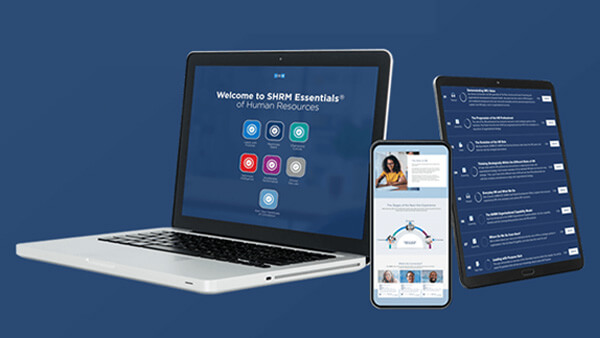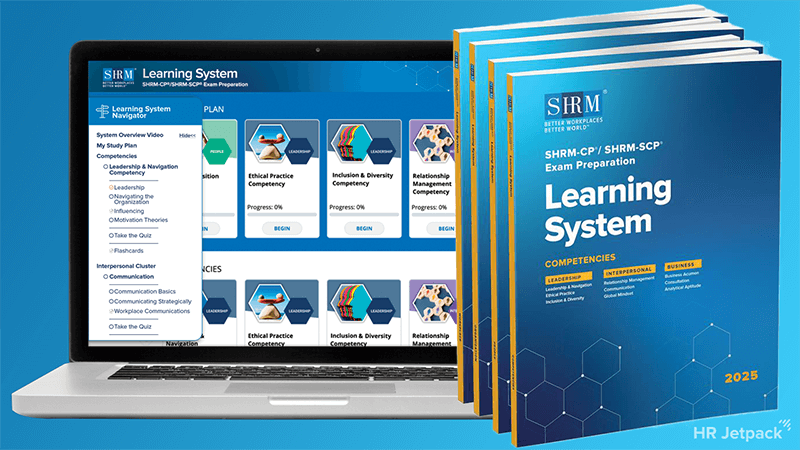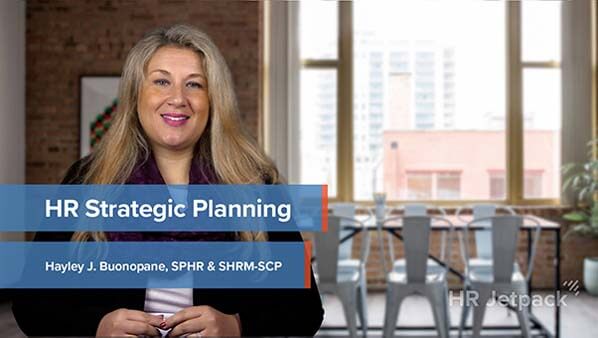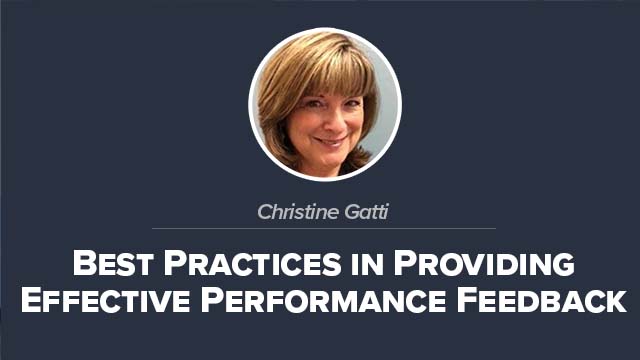Lesson:
Best Way to Study for SHRM Certification Exams?
- Course: SHRM Certification Exam: First Steps
- Module: Additional Guidance
- Lesson Type: Video
- Lesson Duration: 13:21
Lesson Transcript
NOTE: This course is part of the SHRM Certification Exam Prep Program.
Let's move on to the next question that often causes anxiety. What's the best way to study? This is a pretty broad question. It's really all about you and your learning style. Reviewing several key tips can help you develop the study plan that's best for you. Here's a list of my top 10. Tip number one, develop and follow a plan.
Identify an exam date or an approximate date of when you think you'll sit for the exam, then work your way backwards. Set aside six to eight hours a week for about 12 to 18 weeks leading up to your exam date. For instance, let's say you've decided to take your exam in a winter exam window after the new year, you're going to target end of January, go backwards on the calendar about 18 weeks to select your preparation start time. Each week leading up to the end of January, block out six to eight hours for studying. Be specific with dates and times. Now let's say you're taking a class online or in-person scheduling is pretty straightforward. At HR Jetpack our classes are typically 36 hours and have a set schedule. Blocking out this time on your calendar is fairly easy.
However, it's the remainder of the time that can be challenging to add your weekly schedule. I know this isn't easy. I had a student who used to lock herself into a home office while her partner watched their young child in the evenings. She used to call it mommy's study time. She would tell her family not to disturb her unless it was an emergency.
When you block out all these hours on your schedule, you have made a commitment to your preparation. Keep it consistent. Eventually you'll want to know when your study blocks are without needing to look at the calendar. The less complicated the better. It's important to note developing a study plan is very personal.
It's all about you, your life responsibilities and your needs. There are many different factors that could impact it. You must create a plan that's flexible and works best for you. Tip number two for the best way to study is identify the right study environment. Turn off social media notifications, including your email inbox.
When you're building your plan remember to identify the right space to spend all these hours of preparation. Again, this is also very personal. Whether you're at home, in transit, at work or at the library, having the right place to study is incredibly important. Some may need absolute silence around them while others may prefer music or even a TV on to provide some level of noise.
It's all about you and your personal needs. Again, this is no time to have your social media accounts open. These notifications are a distraction. They are day to day interruptions that can break your concentration. Tip number three, for the best way to study, practice the four R's. There is so much information coming at you. After you put together your plan and identified the right environment I recommend practicing the four R's reading, reviewing, responding, and repeat. In other words, you must read your study material. Review the materials to ensure you understand all the concepts, respond to multiple choice practice questions, and repeat. If you already own the SHRM Learning System this is all laid out for you, but you can also do this with your own materials. Tip number four for the best way to study, use a method of self-explaining. I absolutely love this study technique. It may sound a little strange at first, but it works. Explaining a concept or theory to yourself out loud is a great way to learn and remember content. Self-explaining literally involves asking yourself explanatory questions like "what does this mean?" and "why does it matter?". You respond and explain material to yourself. A study has shown that students who have used this approach learned almost three times more than those students who didn't. I highly recommend using this strategy. Tip number five for the best way to study. Remember the power of flashcards.
There are a number of key terms you'll need to know for the exams. Flashcards are a great way to review the vocabulary. This traditional method of study can usually be done anywhere. Although the exam isn't about memorization it's very important for you to know what a word or phrase means in the context of a sentence. To take it one step further try making the flashcards yourself. Experts say the process of making flashcards boosts active recall. Active recall is a concept of continually working to remember this information. It has been known to strengthen brain neural connections, which help improve memory. Tip number six, for the best way to study.
Take notes and, or use a highlighter for terms and concepts. This tip is especially helpful for those who aren't a big fan of using flashcards and are better at remembering definitions when they see them in the context of a sentence. It's also helpful for those who aren't taking a live or prerecorded instructor-led class. Using that highlighter you'll want to identify key terms and concepts as you're reading.
You can also summarize information by writing notes in your books. After you've read a section, take a few notes about the key concepts, reflect on it. Take a moment to think about how this particular concept could relate to your day-to-day work experience. Doing so can help you better retain the information.
If you're taking a class, you can take notes while the instructor is reviewing the content, either in your books and a notebook or on your computer, wherever. It's all about what makes the most sense for you. I had a number of students who would open their books, physical or digital during class and mark off particular terms, or write down a summary of a story I shared to explain a concept. When taking an online class, my method is to pull up a word document on my computer, reduce the size, so it takes up only half of my screen, log into the class and position the instructor's screen, just above my word document. Although I'm not typing everything the instructor says, I find that when I try to summarize their words, I am much more likely to understand and learn the information. Tip number seven for the best way to study, identify a community. You don't have to do this alone. If you're self studying, there's a number of opportunities to join a community or study group. Your community is different than your team.
Your team members are those who influence your time and attention. Your community is made up of those who are currently preparing to earn their SHRM certification or have already earned their SHRM-CP or SHRM-SCP. I'm talking other HR professionals like yourself. There are a number of benefits to joining a community, having a common goal and a similar journey helps in at least two ways. Knowledge transfer and motivation. Learn from others who have been where you are, discuss your concerns, find out what worked for those who have passed. The knowledge and advice you can get from each other is amazing. When you see someone in your group post, I pass my exam today, it will motivate you.
It makes your goal feel much more real. Where do you find a community? Visit your local SHRM chapter. Look for an HR meetup or identify an online study group. HR Jetpack has a private online study group for those who enroll in our SHRM certification prep program. It has hundreds of members. Other programs may have something similar.
You are not alone. There are so many HR pros like you preparing for these exams. We aren't necessarily talking about a formal study group either. It could be as simple as a few folks at your workplace working diligently to earn their SHRM certification. If you're not a fan of larger groups or don't have access to an online or in-person community, identify a Study Buddy.
This could be someone who is using the same learning materials as you. Discussing the materials, or simply checking in can trigger meaningful conversations, which will lead to learning. You can also help hold each other accountable so you can stay on track with your study plan. HR can be a lonely profession. Preparing for your SHRM certification doesn't have to be. Don't go it alone. Join a community. Tip number eight for the best way to study. Take a break. Crazy, right? The idea of taking your break when you have so much information to review and understand doesn't seem right. However, over studying is a problem. It can lead to greater stress and anxiety.
Taking a break can help keep you from burning out. It's okay to walk away and leave it for the next day. Now I'm not talking about walking away for one to two weeks, unless of course it's due to some type of emergency. If you set your goal to take your exam on a particular date or within a certain timeframe, you need to stick with your plan.
That plan should include breaks. You need to strike a balance. It's important to be disciplined, but are you giving yourself enough time to absorb the information? Walking away can give you an opportunity to refocus your energy, relax and regroup. Tip number nine for the best way to study, don't study the day of your exam.
Some students are very surprised by this tip. By the time you reach the day of your exam, you'll have reviewed and studied as much information as possible. You'll probably be feeling stressed out. The likelihood of you taking in and remembering any new information is pretty low. It's time to accept the fact that it's almost exam day. Get yourself mentally prepared for it.
I've had students tell me they took a couple days off from work the day of, and the day before their exam. One student told me she got a massage. By the way, she passed her exam. Now, I'm not saying that getting a massage will guarantee or even increase your chances of passing the exam, but there is something to be said about accepting all that you've done up until this point.
Take a walk, listen to your favorite music, spend some time with loved ones or treat yourself to your favorite food. No matter what try to make the day before and the day of the exam about you. Tip number 10 for the best way to study, build your stamina. And don't cram. It is not unusual for someone to contact me and openly admit they crammed for the exam.
And of course, didn't pass. At this point, they realized that that wasn't a good strategy and they're looking to join a class. Learn from their mistakes. You cannot cram for this exam. We're talking 80 plus hours of preparation to pass a SHRM certification exam. This is not doable a few weeks before your exam date. A big part of the process is about building your stamina.
Your study plan must absolutely must include time answering practice questions for extended periods of time. Answer a question or two as a daily routine is a good practice, but it's like training for a marathon by sprinting every day. You also need to incorporate long runs to build up your ability to focus for long periods of time.
If you already have the SHRM learning system, you have access to over 2,500 practice questions. So there is plenty of opportunity to take those long run. Building your test taking stamina is one of the most important parts of preparing yet it's the most overlooked. Don't make this common mistake. Start building your mental stamina right as you begin your journey.

Instructor:
Christina Danforth
Christina A. Danforth, SHRM-SCP & SPHR, author of Becoming a Human Resources Professional, launched HR Jetpack in 2016 to support the development and professional growth of her fellow HR colleagues....
Christina's Full BioModule 1 0/6
Setting The Foundation
Module 2 0/3
Leadership Competencies
Module 3 0/3
Interpersonal Competencies
Module 4 0/3
Business Competencies
Module 5 0/5
Technical Competency: People
Module 6 0/5
Technical Competency: Organization
Module 7 0/4
Technical Competency: Workplace
Module 8 0/4
Additional Guidance
HR Courses
Human Resources Training Programs
Self-paced HR Courses
The following HR courses are self-paced (asynchronous), and qualify for both SHRM and HRCI recertification credits. These courses are included in the HR Recertification Subscription.
Duration: 1 hr 1 min
SHRM: 1.0 PDC
HRCI: 1.0 General

Liz LaForte
Duration: 1 hr 30 mins
SHRM: 1.5 PDC
HRCI: 1.5 General

Dawn Tedesco
Duration: 1 hr 4 mins
SHRM: 1.0 PDC
HRCI: 1.0 General

Hayley Buonopane
Duration: 1 hr 18 mins
SHRM: 1.25 PDC
HRCI: 1.25 General

Christina Danforth
Duration: 2 hr 5 mins
SHRM: 2.0 PDC
HRCI: 2.0 General

Craig Haas
Duration: 2 hr 30 mins
SHRM: 2.5 PDC
HRCI: 2.5 General

Christina Danforth
Duration: 1 hr 6 mins
SHRM: 1.0 PDC
HRCI: 1.0 General

Lois Krause
Duration: 1 hr
SHRM: 1.0 PDC
HRCI: 1.0 General

Craig Haas
Duration: 1 hr 8 mins
SHRM: 1.0 PDC
HRCI: 1.25 General

Stephanie Legatos
Duration: 1 hr
SHRM: 1.0 PDC
HRCI: 1.0 General

Karen Hinds
Duration: 1 hr
SHRM: 1.0 PDC
HRCI: 1.0 General

Hayley Buonopane
Duration: 1 hr
SHRM: 1.0 PDC
HRCI: 1.0 General

Christine Gatti
Duration: 1 hr
SHRM: 1.0 PDC
HRCI: 1.0 General

Hayley Buonopane
Duration: 1 hr
SHRM: 1.0 PDC
HRCI: 1.0 General

Christine Gatti
Duration: 1 hr
SHRM: 1.0 PDC
HRCI: 1.0 General

Hayley Buonopane
Duration: 1 hr
SHRM: 1.0 PDC
HRCI: 1.0 General

Hayley Buonopane
Duration: 1 hr
SHRM: 1.0 PDC
HRCI: 1.0 General

Christine Gatti
Duration: 1 hr
SHRM: 1.0 PDC
HRCI: 1.0 General

Christina Danforth
Duration: 1 hr
SHRM: 1.0 PDC
HRCI: 1.0 General

Stacey Zackin
Duration: 1 hr
SHRM: 1.0 PDC
HRCI: 1.0 General

Stacey Zackin
Duration: 1 hr
SHRM: 1.0 PDC
HRCI: 1.0 Business

Dr. Deborah Osgood
Duration: 1 hr
SHRM: 1.0 PDC
HRCI: 1.0 General

Christine Gatti
Duration: 1 hr
SHRM: 1.0 PDC
HRCI: 1.0 Business

Jack Antonich
Duration: 1 hr
SHRM: 1.0 PDC
HRCI: 1.0 General

Christine Gatti
Duration: 1 hr
SHRM: 1.0 PDC
HRCI: 1.0 Business

Jack Antonich
Duration: 1 hr
SHRM: 1.0 PDC
HRCI: 1.0 General

Stacey Zackin
Duration: 1 hr
SHRM: 1.0 PDC
HRCI: 1.0 General

Stacey Zackin
Duration: 1 hr
SHRM: 1.0 PDC
HRCI: 1.0 Business

Jack Antonich
Duration: 1 hr
SHRM: 1.0 PDC
HRCI: 1.0 General

Stacey Zackin
Duration: 1 hr
SHRM: 1.0 PDC
HRCI: 1.0 Business

Jack Antonich
Duration: 1 hr
SHRM: 1.0 PDC
HRCI: 1.0 General

Stacey Zackin
Duration: 1 hr
SHRM: 1.0 PDC
HRCI: 1.0 General

Christine Gatti
Duration: 1 hr
SHRM: 1.0 PDC
HRCI: 1.0 General

Christine Gatti
Duration: 1 hr
SHRM: 1.0 PDC
HRCI: 1.0 General

Christine Gatti



































































